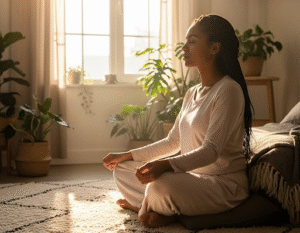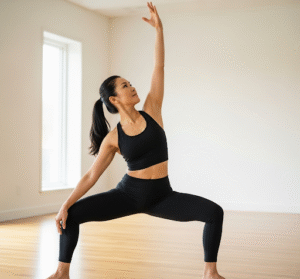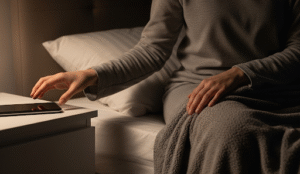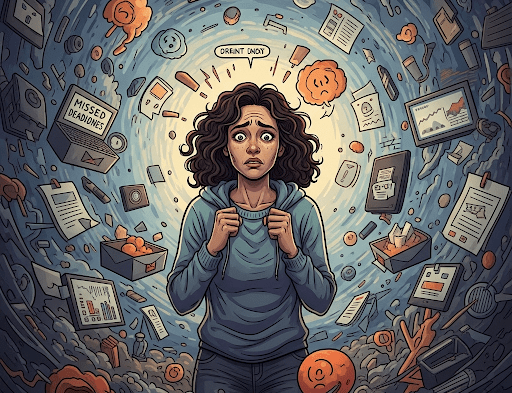Everyday anxiety is the normal kind of stress or nervousness we all feel from time to time. It shows up in situations like getting ready for a big test, running late for work, or dealing with money problems. everyday anxiety is a natural part of life and can actually help us stay alert, focused, and motivated. It usually doesn’t last long and goes away once the stressful situation is over. Examples of everyday anxiety are: Worrying before a job interview or public speaking event, feeling nervous before a test or exam, being concerned about finances or upcoming bills, feeling uneasy during conflicts with friends or family, stressing over being late or missing a deadline.
The Role of Daily Practices in Reducing Everyday Anxiety
Everyday anxiety might be a normal part of life, but that doesn’t mean you have to let it build up or take over. Simple, consistent daily habits can make a big difference in how you feel and cope with stress.
Daily practices help you stay grounded, prevent stress from piling up, create a sense of control, support your brain and body and build resilience.
1.Mindful Mornings to ease Everyday Anxiety:
Starting your day with a clear purpose can help you feel less stressed. A mindful morning doesn’t need to be long or hard. Just take a little time to slow down, be in the moment, and give yourself a peaceful start to the day.

- Wake up gently by giving yourself extra time and avoiding your phone to let your mind ease into the day naturally.
- Take three deep breaths by inhaling through your nose for 4 seconds, holding for 4, and exhaling slowly through your mouth for 6, repeating this while sitting up to calm your nervous system.
- Set an intention by asking, “How do I want to feel today?” and choose affirmations like “I choose calm,” “I will be kind to myself,” or “One step at a time.”
- Spend 2–5 minutes journaling by writing down three things you’re grateful for or one thing you’re looking forward to, shifting your focus from worry to appreciation.
- Move your body lightly—stretch, do yoga, or take a walk to release tension and boost your mood; if short on time, try shoulder rolls or arm stretches while brushing your teeth.
- Create a peaceful moment by sipping your tea or coffee slowly, savoring the warmth and flavor, with no screens—just you and the moment.
2. Movement and Physical Activity to Manage Everyday Anxiety:
Moving your body is one of the simplest and most effective ways to ease everyday anxiety. You don’t need to run a marathon or hit the gym hard—any kind of movement can help!

Here are easy ways to move every day: Take a quick 10-minute walk outside, even just around the block. Try gentle yoga or stretching to relax your muscles. Dance to your favorite song in your room. Do simple exercises like jumping jacks, squats, or arm circles. If you sit a lot, use a standing desk or take short breaks to stretch.
Exercise can help reduce anxiety by releasing feel-good chemicals in your brain, calming your mind, and easing tension in your body. Even a little movement can make you feel more relaxed and in control.
3. How Nutrition and Hydration Can Help Ease Everyday Anxiety:
What you eat and drink can affect how you feel. Some foods help calm your mind and body, while others can make you feel more anxious or jittery. Eating balanced meals with plenty of fruits, vegetables, and whole grains can support a calm mood. It’s also important to drink enough water throughout the day because staying hydrated helps your brain work well and keeps your body feeling good.

Be careful with caffeine and sugar—they can give you quick energy but may also increase feelings of anxiety or make it harder to relax. Try to enjoy coffee, tea, and sweets in moderation to keep your mood steady and avoid crashes. Taking care of your nutrition and hydration can make a big difference in how calm and focused you feel each day.
4. Habits for a Peaceful Mind:
Calm starts in your mind. Each day, think about things you’re thankful for to help reduce stress. Speak kindly to yourself with positive words and reminders. When negative thoughts come up, notice them without getting upset and try to focus on something better. These habits help you feel more peaceful and balanced over time.
5. Device Time Management:
Setting limits on technology can help you feel less stressed. Try to use your phone and computer less to give your mind a rest. Turn off notifications during meals or before bed so you aren’t distracted. Follow positive and happy content online to keep your mind calm. These simple habits help you stay peaceful and focused.

6. Find Calm in Everyday Anxiety with Mindful Moments and Meditation:
Taking a few minutes each day for mindfulness or meditation can help you feel calmer and more focused. Even just 5 minutes of quiet breathing or guided meditation can make a big difference. Grounding techniques, like paying attention to your senses or noticing your surroundings, help bring your mind back to the present moment when you feel stressed.

There are many easy-to-use apps and tools designed for beginners that can guide you through meditation and mindfulness exercises. Using these regularly can help you build a peaceful habit and reduce anxiety over time.
Learn more about meditation practices on this site:
https://www.headspace.com/meditation/techniques
7. Pre-Sleep Soothing Rituals for Managing Everyday Anxiety:
Having a relaxing routine before bed helps your mind and body get ready for sleep. One important step is to disconnect from screens like your phone, tablet, or TV at least an hour before bedtime. The light from screens can keep your brain awake, so turning them off helps you feel sleepy naturally.
Journaling for a few minutes in the evening is a great way to think about your day. You can write down what went well, what you’re grateful for, or anything on your mind. This helps clear your thoughts and reduces worry, making it easier to relax.

Creating a calm and comfortable sleep space also matters. Keep your bedroom quiet, cool, and dark to help your body know it’s time to rest. You can use blackout curtains, earplugs, or a white noise machine if needed. Avoid bright lights and loud noises, so your sleep is deeper and more refreshing.
When Extra Help Is Needed?
Sometimes, anxiety can feel too hard to handle by yourself. You should get help if your worry lasts a long time, is very strong, or stops you from doing everyday things like work or school. If you avoid things because of anxiety or have physical feelings like a fast heartbeat or trouble sleeping, talking to a therapist can help.
When you see a therapist, just be honest about how you feel. They want to help, and it’s okay to take your time. You can also find help from support groups, apps, books, or by talking to someone you trust. If you ever feel really upset, there are hotlines you can call. Asking for help is brave, and you don’t have to face anxiety alone.
Stay connected with us for more such lifestyle related articles! Read the latest news of India and the world on Khabari Bandhu – Business, Education, Entertainment, Religion, Cricket, Horoscope and much more.


1 thought on “7 Simple Practices to Reduce Everyday Anxiety: Easy Moves to Ease Your Worries”